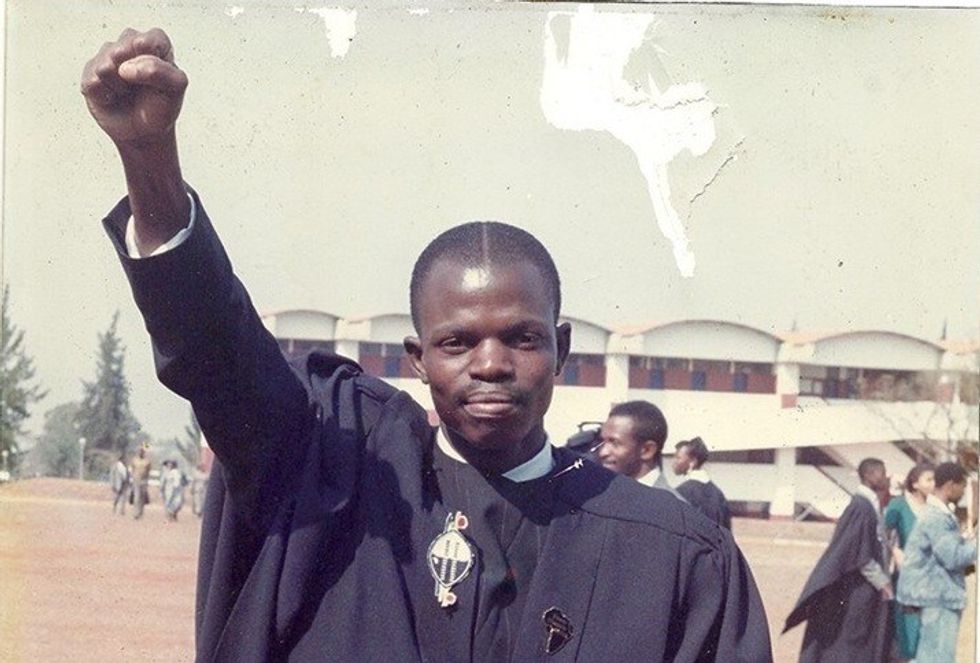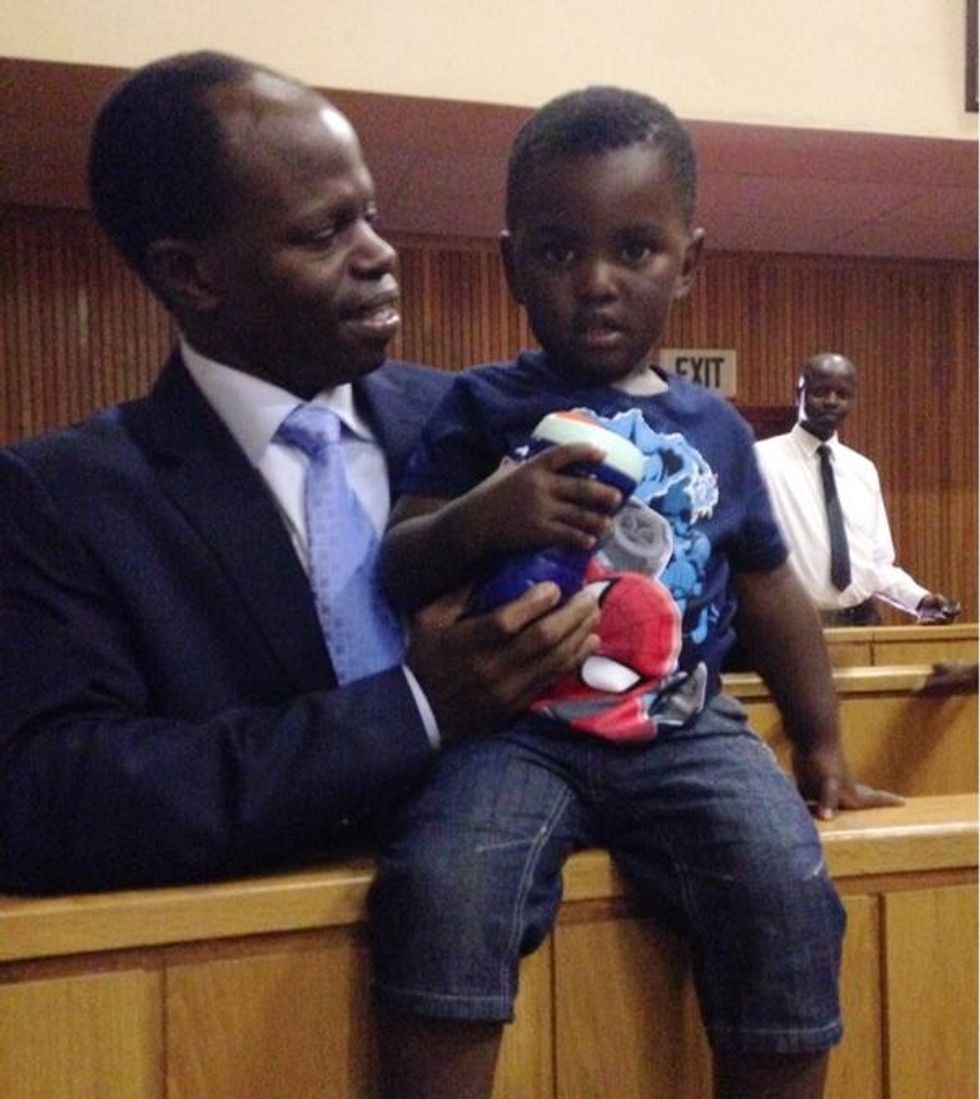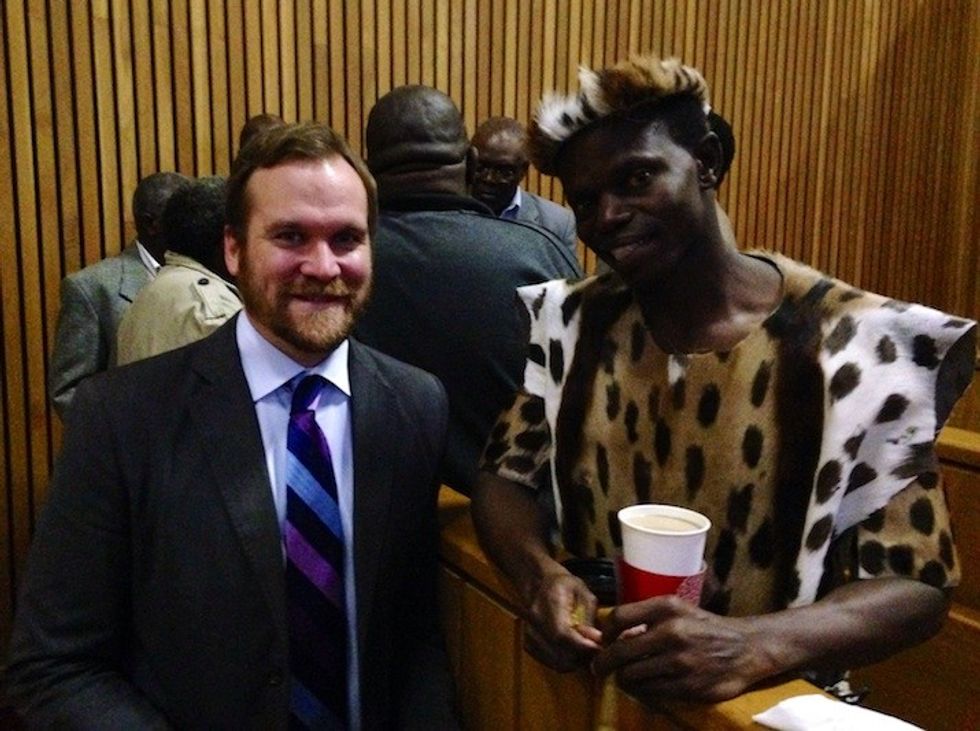"We Are Not Deterred” - A Prison Letter From Swazi Human Rights Lawyer Thulani Maseko On The One Year Anniversary Of His Detention
Swazi human rights lawyer Thulani Maseko pens a letter from prison on the one year anniversary of his ongoing detention.

Photo via @thulanirmaseko
***Update March 19th 2015***
Due to the publication of the below letter on March 17th, Thulani Maseko has been forcefully moved to solitary confinement for three weeks and denied visitors. Revealed earlier today when Thulani's lawyer, Sibusiso Nhlabatsi, attempted to make a routine visit, he reported the following:
"Kindly take notice that the Big Bend prison authorities have condemned Thulani Maseko to solitary confinement for a period of three weeks starting from today Thursday March 19, 2015. While the prison officials were reluctant with the information they cite Maseko’s continual writings whilst incarcerated as a violation of the prison code [Ed. note: no such prison code exists] and the reason for solitary confinement punishment. When I inquired as to the effects of the sentence; I was informed that he will forfeit some privileges i.e. visitations. This means that for three weeks his relatives and legal team won’t be able to see him. The prison authorities were reluctant with the information citing that it was all an internal process."
Remarking on the abrupt developments, Jeffrey Smith of Robert F. Kennedy Human Rights urged those concerned to sign this petition and suggested taking to social media, using the hashtag #SwaziJustice, to help raise awareness of this brazen crackdown on Thulani’s basic human rights.
Introduction by Jeffrey Smith:
My friend Thulani Maseko is one of the most courageous human beings I have ever met. He is an unflinching iconoclast in Swaziland, Africa’s last absolute monarchy and the continent’s most quietly repressive nation. Thulani has fearlessly campaigned to highlight the inherent deficiencies of the Tinkhundla system of governance, which vests undue power in the hands of one man: King Mswati III, who assumed power at the age of 18, following the death of his father, and previous king, Sobhuza II.
A year ago today, Thulani and Bheki Makhubu, a veteran magazine editor, were each sentenced to two years in prison for writing, and then publishing, articles that were critical of Swaziland’s undeniably rotten judicial system. Thulani has remained steadfast and brave, despite the clear, and still ongoing, miscarriages of justice against him, which include a farcical sedition trial slated for this summer.
During a break in an appeal hearing last November, Thulani and I made eye contact and he motioned for me to join him near a cordoned off area of the courtroom, where he was guarded by several stern-faced officers at all times. At his feet lay the iron leg shackles used to escort him to and from the court, which is perched atop a picturesque hillside in Swaziland’s capital, Mbabane. Thulani put his arm around my shoulder, saying: “Jeff, come here and stand with me. I mustn’t forget how to smile.”
Thulani surely smiles, and is given strength, when he knows the world is watching, when his lawyer and his family members, when they are permitted to visit, inform him that the struggle to uplift ordinary Swazis -- those whose basic human rights continue to be crushed with impunity -- has not been in vain or in isolation. Let’s keep our friend Thulani smiling. And let his profound words below, written from a dark prison cell in a remote corner of Swaziland, inspire you to action. Join us in the campaign for SwaziJustice today.
Jeffrey Smith
Robert F. Kennedy Human Rights
A Letter Of Appreciation To The World’s Human Family For The Solidarity With Our Just Cause
-By Thulani Rudolf Maseko
The biblical Joseph is recorded in scripture as having said that, “You plotted evil against me, but God turned it into good.” And John C. Maxwell tells us “Joseph waited 14 years in prison for a crime he did not commit.” The bible has many men who spent time in prison on the orders of the rulers and kings of those times.
Surely, yes surely, our captors, the architects and proponents of Swaziland’s oppressive Tinkhundla regime, harbor intentions to hurt us so that we submit to their evil desires. And there is some good that has been the result of our persecution. Tinkhundla denialists, cynics, and prophets of doom do not accept it, but there can be no question that our conviction and prison sentence sharply drew the world’s focus to Swaziland in a manner unprecedented in recent times. In the light of the above scripture, this is the good God had intended, for he is the God of freedom, justice and equality. Archbishop Emeritus Desmond Tutu and daughter Mpho Tutu remind us that, “God has a profound reverence for our freedom. I often say that God would rather we go freely to hell than we be compelled to enter heaven.” Tinkhundla, has for so long, denied us our God-given fundamental human rights and basic freedoms and civil liberties. We seek to retain these, our rights and freedoms, no matter what price we have to pay. We shall never surrender.
There is yet another prisoner who spent 27 years in jail for his beliefs. This is the prisoner, in respect of whom, President Barack Obama said: “To the people of South Africa, people of every race and walk of life, the world thanks you for sharing Nelson Mandela with us.” Speaking for all of us, President Obama continued: “His struggle was your struggle. His triumph was your triumph. Your dignity and hope found expression in his life and your freedom. Your democracy is his cherished legacy.” How beautiful these words! Although on different conditions and circumstances, Mandela’s ideals are our ideals too.
Thulani Maseko and his son on second day of appeal hearing in Swaziland's Supreme Court (Photo: Jeffrey Smith)
In the context of those of us who are doing time in jail for what we believe in, the same ideals that drove Mandela, what better person is there to inspire, us if not Madiba himself? We know that those who have thrown us in jail are determined to do so in the future, and that they have acted out of prejudice. They have intended to hurt us, to break our spirit, our moral strength and crash our resilience so that we succumb to their evil desires. But we derive strength knowing that the world has stood, and continues to stand, with us and by us.
Prison is indeed meant to crush us because the conditions are horrendous. As Mandela said in 1967, we say so in 2015, from the king’s prison in Swaziland that for instance, “no pillows are provided and we forced to use other articles…as pillows.” Not only are we denied proper bedding such as pillows and bedding sheets, we do not “have the right to sleep in pyjamas.” One is forced to either to “sleep naked with only blankets as a cover,” or sleep in one’s own prison garments, turned inside out, to keep them neat and clean.
Over and above this, we must put up with sleeping on the floor and use tiny canvas mats. To spice it all, prison life is routine, including the meals of cabbage, beans and a very small piece of chicken. Just as much as the barbaric and oppressive Tinkhundla regime seeks to deny and deprive us of our value as full human beings, it is absolutely correct that “prison and the authorities conspire to rob each man of his dignity. Prison not only robs you of your freedom, it attempts to take away your identity.”
So, while we fight the many injustices and indignities of Tinkhundla outside these prison walls, we have almost similar battles to fight in prison. And the early campaigners of human rights, freedom and democracy on whose footsteps we follow were right that prison, for all intents and purposes, is a minor image of the bigger system outside.
In spite of the prison hardships, we are not deterred. We are not discouraged. We are not fazed. We are not shaken. We are not intimidated. Yes, we are not broken.
While President Obama spoke well for all of us in thanking South Africa for sharing Madiba with the world, we are also grateful for the life of Reverend Martin Luther King Jr. Here is a leader who said: “Nobody with any sense likes to go to jail. But if he puts you in jail, you go in that jail and transform it from a dungeon of shame to a haven of freedom and human dignity.” And he goes on to say,” and even when he tries to kill you, you develop the inner conviction that there are some things so dear, some things so priceless, some things so externally true that they are worth dying for.” This is the man who tells us that, “and I submit to you that if a man has not discovered something that he will die for, he isn’t fit to live.”
Please allow us to say that we are in prison because we are very fit to live. We are not ashamed, for there is nothing to be ashamed of for standing up for what is right, what is high, what is noble. There is nothing to be ashamed of for standing up for good against an evil system. There is absolutely nothing to be ashamed of for standing up for something great. We are not broken because these, our teachers, these our mentors, tell us that if some ideals are worth living for, then they are equally worth sacrificing for, and if need be, are worth dying for.
Jeffrey Smith & Thulani Maseko at Maseko's appeal hearing in Swaziland's Supreme Court on Novemer 4, 2014
As we draw to a conclusion, it pains us to hear the leaders of our country raising a hullaballoo about “enemies of the country,” people who “tarnish the image of the country,” and the “jealous people.” We want to say that the true and real enemies of Swaziland, and its people, are those who are opposed to democracy. The true enemies of Swaziland, and its people, are those who undermine the rule of law. The true jealous people are those who continue to trample, suppress and abuse the fundamental human rights and basic freedoms and civil liberties of the rank and file of our people. Those who say we attack and condemn the country are completely missing the point, are misguided and misdirected.
Swaziland, our country, is a tiny and beautiful land. Its people are humble, equally beautiful and equally hospitable. It is the Tinkhundla system that has an image problem. And this distinction is important. If Tinkhundla, as a system of government has any image at all, it has an image of oppression, and it only has itself to blame.
You see, Tinkhundla must realize that, at best, it is like a Christian who refuses to accept that all have sinned and are in need of the grace of God. At worst, Tinkhundla, by its very nature and character, is like a man, or a drunken man, who looks at himself in the mirror and sees how horrible he looks and then says, “O, this is not me.” Such a man begins to point a figure and accuses his children and his neighbours for his own self-created bad image. Accordingly, for as long as Tinkhundla and the leadership of our country remain recalcitrant and intransigent about change, we have a right, responsibly and obligation to name and shame it until it succumbs to the demand for democratization.
In closing, the Tinkhundla leaders, its supporters, its fans and proponents, may call us whatever names they choose. They shall never conquer our spirits. They may keep us in jail as much as they please, but they can never arrest our ideas. So, in the final analysis, Madiba who inspires us right here in prison, is right when he says: “It is only my flesh and bones that are shut up behind these tight walls. Otherwise, I remain cosmopolitan in my outlook; in my thoughts I am as free as a felon.”
Since that fateful day on March 17, 2014 the failure of leadership in our country has been proved beyond any shadow of doubt that Tinkhundla has dismally failed. We need to unite around a discussion table to negotiate the birth of a new democratic society, a new and democratic Swaziland. In the words of the great Mahatma Gandhi, we seriously believe in the righteousness of our cause.
We are short of sweet and beautiful words to express thanks to the thousands around the world who have supported us. We cannot be more grateful. The great mentor speaks for us when he says, “We shall never forget how millions around the world joined us in solidarity to fight the injustice of our oppression while we were incarcerated.” Indeed, we draw strength and sustenance from the knowledge that we are part of a greater humanity.
Writing from a narrow prison cell to the church of the Philippians, the charismatic Paul said: “I think of you…because of the way in which you have helped me…you are always in my heart.” From prison, we adopt Paul’s words as ours and say: Thank you, thank you, and thank you. God bless you.
Yours sincerely,
Thulani Rudolf Maseko
Prisoner 579/2014
His Majesty’s Big Bend Prison
Lubombo, Swaziland
Jeffrey Smith is an Africa specialist at Robert F. Kennedy Human Rights. Follow him on Twitter at @Smith_RFKennedy.




